-
Posts
207 -
Joined
-
Last visited
Content Type
Events
Forums
Downloads
Quizzes
Gallery
Blogs
Posts posted by asd
-
-
Election results are a rude wake-up call for Thaksin
The returns from Sunday's election are defying all predictions. Even Prime Minister Thaksin Shinawatra and his all-powerful Thai Rak Thai Party have been caught off guard, falsely believing as they did that the stage-managed election was to be a sure bet to reclaim their political mandate.
The overwhelming number of abstention votes are sending out the loudest of political messages, one that Thaksin is finding hard to ignore. It is tantamount to a rejection of what has become known as "Thaksinomics" - a CEO-style of leadership signified by corruption, cronyism and conflicts of interest.
Until the first ballot was cast, the election results appeared to be a foregone conclusion. Thai Rak Thai was running without a significant rival. Thaksin's populist appeal was still his strongest asset. The campaign to oust the business tycoon turned politician from office seemed to be confined to the urban masses. And from all appearances, the campaign for voters to go to the polls but abstain as a gesture of protest simply did not seem to be gaining much steam.
So everybody was stunned when it became clear from early returns that there were far more abstention votes than one would have expected, even outstripping votes for Thai Rak Thai candidates in most constituencies, particularly in Bangkok and the South.
The biggest question is what triggered the massive "no vote" now threatening to deprive Thaksin and his party of legitimacy.
The months-long demonstrations led by the People's Alliance for Democracy, of course, were most instrumental in igniting the anti-Thaksin sentiment that eventually spread to practically all sectors of society. Even though daily street rallies drew tens of thousands of people on each occasion, they were not seen as a real impediment to Thaksin's return to power.
But a series of events immediately preceding the election had the effect, many believe, of convincing undecided or reluctant voters their voices could make a difference. Some of the incidents sound isolated but combined were powerful enough to mobilise legions.
One was an encounter the PM apparently didn't expect - especially not after being assured his visit to one of Bangkok's most famous open markets in Soi Lalaisap would be carefully stage-managed. It was so meticulously planned that many of the shop-owners were prepared to parade out with red roses to offer to Thaksin in a choreographed show of support.
But then the unexpected happened. A group of angry shopkeepers led by three ladies broke the silence in a food court where the prime minister was enjoying a bowl of noodles, yelling what has become a familiar refrain: "Thaksin, get out!" Thaksin was no less visibly shaken by the angry chant than the members of his entourage who had planned the visit as a well-publicised campaign event on behalf of the Thai Rak Thai candidate for that area's constituency. For the first time, people were telling him right to his face to get out.
It was without a doubt an act of extreme courage, considering the circumstances of the moment and possible consequences. Widely publicised in the media, it had the effect of inspiring, even emboldening, ordinary citizens who were frustrated with current political leadership but too timid to speak out.
Then last Thursday, more than 2,000 people calling themselves the Caravan of the Poor blockaded the offices of the Nation Multimedia Group on Bang Na-Trat Road, protesting an article deemed lese majeste that had been published earlier in Kom Chad Luek, a Thai-language daily belonging to the group. Although the protest was portrayed as a show of loyalty to the monarchy, its real motive was partly to intimidate the press and partly to flex some political muscles.
The incident, however, backfired. Instead of silencing the media or cowing critics of the government, it galvanised them. The fact that a certain political figure closely associated with the government was behind the potentially violent protest didn't escape the public's attention.
On the same night, former prime minister Chuan Leekpai and Democrat leader Abhisit Vejjajiva were sent running for their lives as hundreds of Thaksin supporters, pelting them with eggs and other projectiles, gate-crashed their Chiang Mai rally. It was a blatant act of violence that flew in the face of democracy. Ordinary people, even those with no real Democrat sympathies, were shocked. What disturbed them even more was the belief that the attack had been sanctioned by the powers that be.
Then early on election day, leading Chulalongkorn University lecturer Chaiyan Chaiyaporn defiantly tore up his ballot before an army of cameramen at a polling booth. He not only sent a powerful political message, but also inspired many who watched his bold act on television or heard about it on radio to come forward themselves to register their own rejection of the ruling party through the ballot box.
If the anti-Thaksin demonstrations that so rattled the political leadership were the starting point, these subsequent incidents probably constituted the tipping point that may eventually pave the way for Thaksin's exit. But the question is whether his will be a graceful exit or one with a high price to be paid in political and social harmony.
Thepchai Yong : THE NATION
---------------------------------------------------
It's unbelievable.

Constituency 9 ( Pak Pa Nang ) There is one seat for opposition party.
Kon kor plod nee party's Maanoat Senachu (NO.10) won the election at Nakhon Si Thammarat province.
Congratulations!

---------------------------------------------------
About 13 Ramkhamhaeng University students marched to the Thai Rak Thai Party's headquarters
"Liar prime minister - very corrupt too"
"Ramkhamhaeng students have awoken, and we will rescue the nation,"
-
-
I don't mean to sound malicious, but did the PM fail his primary school math? Saying that he won 52% of the vote, but then going on to say that 16 million votes want to TRT vs 10 million abstentions. How does this add up?
Right thats like 62%
 Prob spoiled ballots aren't mentioned????
Prob spoiled ballots aren't mentioned????Forty million plus eligible voters, with a 70% poll rate is around 30 million. If TRT claim that they polled 16 million votes, that's his 50 plus percent!! There might well have been 10 million informal votes, but they don't count unfortunately.

-
---------------------------------------------------------
Hundreds of motorcyclists rally in front of Manger Group head office
Hundreds of motorcyclists staged a noisy protest at the head office of Manager Group of Sondhi Limthongkul now.
A live coverage from ASTV showed the motorcyclists arriving and staging a blockade on the Tha Pha Arthit Raod for five minutes at 5 pm and dispersed soon.
They kept shouting "Sondhi get out" during the protest. Manager Online said some motorcyclists also threw things into the compound of Manager Group and some climbed into the compound.
But Manager Group blared a song in satire of Thaksin to fight back at the shouts of the motorcyclists.
Some residents in the neighbourhood also came out to shout "Thaksin get out".
http://www.nationmultimedia.com/
---------------------------------------------------------
We are motorcyclists.

Gangs of New York >>> Gangs of Bangkok

"Sondhi get out" ( Look at left side of the pic >>> Election poster of TRT candidate NO. 2 )
"Thaksi.. Oops, Sondhi get out"

STOP !!!

Let's all calm down !!!
Learn Muay Thai from one of the best kickmotorcyclists of all time.

You don't have to be a martial arts specialist.

Teep Drong ( Straight forward foot push )

Ouch !!!
 ???
???
---------------------------------------------------------
-
-
POLITICAL CRISIS
Democrat leaders attacked in Chiang Mai
Chairs, eggs and paint thrown at party chiefs as violent episode blights lead-up to Sunday's ballot
Democrat Party leaders were attacked and pelted with chairs and a rally they had planned for Chiang Mai was cut short by road blockages and abusive behaviour in a concerted and highly effective campaign by supporters of Prime Minister Thaksin Shinawatra yesterday.
The supporters thwarted the Democrat Party's key members at the airport, blocked the road to the rally venue and threw chairs, rotten eggs, paint and all manner of rubbish onto the stage when they tried to address the rally.
About 100 Thaksin supporters in Chiang Mai, his home town, rushed to Chiang Mai National airport to protest the arrival of Democrat Party leader Abhisit Vejjajiva, who was scheduled to fly in at 4pm for a speech at Chiang Mai University.
The group went inside the terminal without waiting for weapons checking and held banners with messages condemning Abhisit and the party for boycotting the April 2 election. The Democrat leader was forced to evade the protesters by leaving the airport by a rear gate, which angered the protesters who shouted insults at Abhisit and threatened tourists who witnessed the incident.
Another group of Thaksin supporters used their cars to block Nimmanahaeminda Road, where Chiang Mai University's Art Museum is located. Key members of the Democrat Party, including Abhisit, secretary-general Suthep Thaugsuban and senior adviser Chuan Leekpai were stopped from reaching the venue.
The protesters also hung up effigies of the party's key members, as well as leaders of the People's Alliance for Democracy like Sondhi Limthongkul and Chamlong Srimuang and then burned them.
Hundreds of people who wanted to attend the rally had to wait outside and on the streets around the museum.
The rally eventually started at 6pm, with deputy leader Alongkorn Pollabutr as the first speaker. Only 40-50 people who managed to get into the venue before the roadblock was erected listened to him. More Democrat supporters later climbed a fence to get in.
As Alongkorn was speaking, supporters of Thaksin verbally attacked him and the party, as well as the Chiang Mai audience, through amplifiers.
Abhisit was finally able to get to the museum at 7.20pm. He was giving his speech and telling people why the party had boycotted Sunday's election when about 300 Thaksin supporters rushed the stage. They shouted at him and other party members.
About 100 police and security officers tried to drive the protesters back, but failed and Abhisit had to end his speech 10 minutes later.
The party's spokesman, Ong-art Klampaiboon, said the rally was cancelled and no plans made for a new one.
Nobody was seriously hurt in the attack, he said, although Chuan was hit with a chair and deputy party leader Chaiwut Bannawat had to use his arms to protect himself from a thrown chair.
Some of the protesters stayed in the art museum until 8pm, while some of the key Democrat members were still there.
After the Democrat executives left, Prachuab Wangjai, editor and anchorman of the Nation Channel in Chiang Mai, was punched in the ear.
Members of the audience who turned up to see the Democrat leaders were visibly shaken by the violence from the pro-Thaksin camp. A third-year medical student at the university broke down and cried, saying all she wanted was to hear some political information but instead had to deal with barbaric people. She did not understand why the protest had got out of control and why police had allowed it to.
A university lecturer said it was not the kind of behaviour you would expect to see in Chiang Mai, so it was quite likely the protesters were hired from outside. She said it was an embarrassment for Chiang Mai people.
source: http://www.nationmultimedia.com/2006/03/31...es_30000602.php
Thaksin is trying to divide Thailand into:
Thais who don't want Thaksin vs Poor upcountry Thais who will give their life to support Thaksin for a payment of 300 baht.

-----------------------------------------------------------------------
Democrat Party leader Abhisit Vejjajiva speech at Chiang Mai University.
It was quite likely the protesters were hired from TRT member.

OMG !!!! OMG !!! Battlefield : Chiang Mai University.
Do not kill me plz !!!
"Crazy people" >>> It's useless.
Thaksin supporters announced victory over Democrat leaders

 ?????
?????Thaksin is trying to ruin Thailand !!

-
-
-
Yes, those lecturers from Chulalongkon University, doctors, middle-class ladies, teenagers and students really looked like they were in it for the money.
If you understand Thai and listen to the PAD rallies about 8 pm every night, Sonthi reads out the donations from the public every day, names and amounts are mentioned.
Unlike the rally at Jatujak where the pro Thaksin protestors have to sign in every day to receive their daily allowance.
-
-
-
By Kenneth Crawford
Members of the Confederation of Consumer Organizations of Thailand, led by Rosana Tositrakul, center foreground in black top, celebrate after the court ruling.
-------------------------------------------------------------
In a serious blow to caretaker Prime Minister Thaksin Shinawatra's long-term political platform, the Supreme Administrative Court rescinded two royal decrees in EGAT's privatization plan yesterday, ending the state enterprise's push to issue more than 34-billion-baht's worth of shares on the Stock Exchange of Thailand (SET)
Judge Charan Hattakam said the two decrees- one outlining the authoritative rights and privileges of EGAT, and the other setting the privatization time frame - were "illegitimate."
He cited past privileges to expropriate land on the grounds of national interest and EGAT's unfair competitive advantages as reasons for the ruling.
The court is the only judicial body with the authority to overturn a royal decree, said a constitutional lawyer yesterday. The verdict cannot be appealed.
Surapong Suebwonglee, caretaker spokesman for the PM's office, yesterday said the government respected the court's ruling.
"It is the duty of the new government after the [April 2] election to figure out the next move. The court ruling must be considered,"said Surapong, who insisted the policy to privatize state enterprises should be continued in order to enhance both the economy and the performance of the stock market.
The case was brought last November by the 11 civic groups that make up the Confederation of Consumer Organizations of Thailand (CCOT) and named five defendants, including Thaksin. The court case successfully postponed EGAT's IPO on the day the company was scheduled to begin book building for the 1.245 billion shares.
EGAT executives yesterday met with Energy Ministry officials to discuss how the company will move forward with electricity capacity expansion projects across the Southeast Asian region. Earlier this week, EGAT Governor Kraisri Karnasuta said if the court ruled in favor of CCOT, the company would consider debt instruments, like bonds or commercial bank loans, to help fund the projects.
The meeting between the executives and officials was also used to discuss the repurchase of shares sold to employees before the attempted IPO. In a ploy to stem privatization objections, the state enterprise sold shares to workers at 10 baht each, below the stock's expected price of 25 baht.
The court's decision was a huge blow for Thaksin and the ruling Thai Rak Thai party, which has been vigorously promoting the privatization of state enterprises since it came to power five years ago.
EGAT was due to be the first in a series of state enterprises to go up for sale; others include telecommunication firms TOT and CAT Telecom, both of which have run into their own regulatory and legal battles.
CCOT and anti-Thaksin protesters were quick to respond yesterday.
"Today's ruling is considered yet another victory for PAD," which has strived to end Thaksin's political career for the past two months, said a leader of thePeople's Alliance for Democracy (PAD), Maj-Gen Chamlong Srimuang, who orchestrated the postponement of the Thai Beverage listing last year.
Kanin Boonsuwan, a lawyer who helped draft both the 1997 Constitution and the complaint brought by CCOT in November, told ThaiDay it was an unprecedented case in Thailand's legal history, and given PTT's presence on the SET in the past two years, was a bit of a surprise.
"It's time to take back our national assets," said Kanin, indicating CCOT was likely to move forward with plans to bring state enterprises like EGAT and PTT under full government control.
"To go ahead with privatization, they need to amend the law first by going through the National Assembly. But now there is no Parliament,"he said.
While the verdict did not come as a big shock to stock market investors, it did bring huge disappointment. The SET fell more than two points immediately after the court delivered its verdict, but rebounded half an hour later as the market fully absorbed the news.
"There was no real surprise on the market, but there was a lot of disappointment, especially among foreign investors. People were predicting this for weeks, and I think a lot of stocks already reflected a negative outcome [for EGAT]," Kitti Nathisuwan, head of equity research at TMB Macquarie Securities, said yesterday.
"As for a timeframe to restructure and find capital, I don't really know, but it will have to be soon because EGAT needs the money now for its expansion."
Public concerns that EGAT's limited capacity would lead to brown outs in the second quarter forced Kraisi to make public statements last Sunday, affirming there would be no power shortages. EGAT's long term investments are partly to address ongoing economic growth that has outpaced capacity expansion. The money raised through the IPO would have gone toward these investments.
Thanomsak Saharatchai, an analyst at Capital Nomura Securities, yesterday said: "My second concern is if EGAT has to look at [borrowing from] banks, then it will result in higher [operating] costs.
This cost will likely be passed on to consumers through their bills." -Additional reporting by Daniel Ten Kate
-----------------------------------------------------------
The Supreme Administrative Court rescinded two royal decrees in EGAT's privatization plan in Thai version

http://www.admincourt.go.th/49/s49-0005-js01.pdf
http://www.admincourt.go.th/49/s49-0005-rs01.pdf

-
Happy birthday to you,
Happy birthday to you,
Happy birthday dear Suchinda,
 http://en.wikipedia.org/wiki/Black_May
http://en.wikipedia.org/wiki/Black_May 
----------------------------------------------
From good friends and new,
May good luck go with you,
http://www.angkor.com/2bangkok/2bangkok/bl...lackmay01.shtml

-
Thaksin is the billionaire prime minister of the country who had amassed huge power and a large mandate, but who disappointed his people by his continuous involvement in his business dealings.
Demonstrators are gathering in Royal Square in Bangkok at this moment, calling from Prime Minister Thaksin to resign over a deal that sold off Thailand's largest telecommunications company to Temasek, corruption, mishandling a Muslim insurgency in southern Thailand, stifling the media, and allegedly allowing cronies to reap gains from state policies.
Thaksin refuses to resign, and the People's Alliance for Democracy (PAD) vows not to leave the streets until Thaksin is sent packing.
The problem for the opposition is that the poor countryside population doesn't care much for the government scandals going on. However, it's credit is that it is based largely in the cities which makes it infinitely easier to organize. The pro-Thaksin rallies had to bus in supporters in order to reach crowd masses the same size as the anti-Thaksin protests.
That the unions are joining in, along with the marginal middle class and even the elite, helps their cause. Especially since many of the worker unions are for employees of state-held companies.
The possibility of confrontation between pro-Thaksin and anti-Thaksin groups is also possible given the history of Thailand's people power coups.
I know they are trying to accumulate weapons of mass destruction.

Here's my proof !!!

Beautiful Girls with Guns

Oh we could be in poverty
No one to lend a helping hand
But it's alright, alright I know
Because you'll always understand
I don't care any place, anywhere
Just as long as you are there, baby baby

You drown me with your love
Kill me with your guns
Bang, bang baby

I think the confrontation between anti-government and pro-government will occur after the election held on April 2,2006.
Join in the fun and be prepared to get wet ? Very WET !
Thailand's most celebrated festival is the Songkran Festival.Songkran, regarded as Thai traditional New Year, has been an exotic Thai tradition for generations.
Beautiful breasts in her wet shirt

The Thai people celebrate this festival with water. Everyone gets soaking wet and since it is the hottest season of the year, the custom is quite refreshing. Songkran is a Public Spring Cleaning Day, supported by the religious belief that anything old and useless must be thrown away or it will bring bad luck to the owner.
Girls on the sunny season.

Thais and Farangs like this festival.
Policeman concerned about confrontation between anti-government and pro-government.

-
Part V - Thaicom satellite
Thaksin's rapid success came from two things. First, he secured four telecoms concessions which gave him monopoly or oligopoly rights - in particular, the first Thai mobile phone concession and the first Thai communications satellite. Second, he raised money on the Thai stock market, which was on a rise from 200 in 1986 to 1750 at its peak.
From the start, Thaksin's triumph was dependent on politics. He got his four telecoms concessions at a time when military influence was strong. He had to lobby generals to get them, and he had to reward them.
In one famous instance, he gave a general a Daimler. At the launch of his communications satellite, he said "I could not have this day without Big Jod," the nickname of General Sunthorn Kongsompong, the head of a junta which briefly took control of the country in a coup in 1991. On the other hand, he lost some contests (especially a three-million-line telephone contract in 1991) because rivals had better political connections at the right time.
In 1992, the army lost influence, and politicians began to enjoy more control over concession awards. In 1994, Thaksin entered politics, choosing the party which controlled the communications ministry.
He immediately used his position to angle for another telecom contract and also expanded into highway concessions.
But in 1995-6, Thaksin lost his influence over the ministry of transport and communications. A competitor got a new telephone line contract. Another got a second mobile phone concession, undermining Thaksin's monopoly.
The military began making plans to put up a satellite to compete against Thaksin's. The government signed the World Trade Organisation (WTO) agreement to liberalise telecommunications and other services by 2006.
Clearly, the future success of Thaksin's business depended crucially on political decisions.
"I could not have had this day without Big Jod (Sunthorn),"

-----------------------
 ------------------------------
------------------------------ -
Part IV - Ian Neumegen
--------------------------
 ------------------------------
------------------------------There were many people killed and injured during the Black May disturbances. Since Ian Neumegen was shot near me and there is little about him on the net (or documented elsewhere), here is some info on his life and death.
Ian Neumegen was from New Zealand. He was 40 years old and had lived in Thailand for 12 years (some sources say 14 years). He assisted the Office of the Supreme Patriarch's Secretary and translated Buddhist works including writings by HRH The Princess Mother.
Human Rights Watch reported: "He was shot by an M-16 in the back of his neck shortly after leaving the monastery where he lived to go out for dinner with a friend."
AFP, May 20, 1992: "In Wellington, Foreign Minister Don McKinnon summoned Thai charge d'affaires Artaporn Puthikampol to protest at the killing of New Zealand schoolteacher Ian Neumegen in the riots. McKinnon later said a second, unidentified New Zealander had been shot in the Thai riots and was fighting for his life Wednesday in a Bangkok hospital."
As usual, the Bangkok Post had its facts wrong, as recently as 1997 reporting him as "Ian Newmeken - Australian." (Those killed during the May uprising of May 17-21, 1992, Bangkok Post, May 19, 1997)
HM The King sponsored the funeral ceremony.

Click here for more information
http://www.2bangkok.com/2bangkok/blackmay/blackmay05.shtml
-----------------------------
 ------------------------------
------------------------------ -
Part III - Black May
Black May was a public uprising in Bangkok, Thailand over four days beginning on May 17 1992 against the military dictatorship of General Suchinda Kraprayoon, who had assumed power through a coup d'etat a year earlier and had established martial law.
Students and other citizens organized a rally in central Bangkok to protest the imposition of martial law, and were confronted by heavily armed troops in full battle gear, who fired into the crowd of protestors. Forty-four people are believed to have been killed, and nearly forty are still unaccounted for.
Following the bloodshed, the military retreated to its barracks, and an election was held within months.
Click here for more information
http://www.siamweb.org/content/News-Cultur...ear1997_tha.php
----------------------------
 ------------------------------
------------------------------The main coup leaders, who formed the National Peacekeeping Council or NPC, are seated in white uniforms. From left - army commander General Issarapong Noonpakdi, General Suchinda Kraprayoon and General Sunthorn Kongsompong.
----------------------------
 -------------------------------
-------------------------------On February 23, 1991, the military, led by Sunthorn Kongsompong, staged a bloodless coup and installed a group of generals called the National Peacekeeping Council to administer the country. The constitution was abolished and martial law imposed.
This coup happened during the first days of the Gulf War invasion and was overshadowed by news of the war in the international press. The main coup generals were from Class 5--cadets from the same class that stick together as they move through the ranks.
As the coup occurred, all television channels showed the army TV station logo and occasionally a tape of a person, surrounded by menacing army personnel, reading a statement admitting he was involved in an assassination conspiracy (this was one of the reasons the generals said they had to take power).
There was not a large amount of popular dissent at the time. The Chatichai Choonhavan government that was overthrown notable as the first peaceful changeover of power from one democratically elected government to another when it took power from the Prem Tinsulanonda. Together the Prem and Chatchai governments were largely responsible for Thailand's economic miracle that created the Thailand most are familiar with today.
However, the Chatchai government was perceived as corrupt and the Thai experiment with democracy was very young.
After the coup, disruption to everyday life was brief. A popular and credible interim Prime Minister--Anand Panyarachun--was installed. As a former Thai ambassador to the U.N., U.S., and Canada, he was well-known and liked internationally.
Besides the veneer of respectability he gave the regime, his brief tenure was notable for allowing awareness of HIV prevention to be widely disseminated for the first time.
To cater to foreigners, a number of reforms were implemented, such as work permits in 30 days and abolition of the notorious procedure that required foreign businessmen to buy places in line to bribe officials to get a tax certificate before leaving the country.
Today, foreigners are aware of corruption and may come into contact with it, but before the coup, the tax certificate system insured every foreigner was intimately aware and complicit in bribe giving and taking.
Cracking down on unions seemed to be a priority of the new regime. State labour unions were abolished and one of the more notable excesses was the unexplained disappearance of labour activist Thanong Po-an.
New elections were held in May 1992, and the public quickly labeled political parties as good or evil depending on which rushed to support the generals' agendas.
After the elections, a strange series of events culminated in one of the coup leaders, Suchinda Kraprayoon, being appointed prime minister. The opposition kept the pressure on the government to appoint an elected person to be prime minister citing previous promises from Suchinda that he would not take the post.
The appointment of Suchinda gave the opposition the issue they needed--an unelected prime minister boldly gaining taking the top post after innumerable denials that the generals intended to keep power.
A series of demonstrations against the government centered around Sanam Luang and were led by activist students. Eventually the protests attracted many common folk and paralyzed the city as the Sanam Luang and Rachadamneorn Road areas were occupied by police and protesters for many days.
Soldiers advance through Banglampoo Tuesday, May 19, 1992
A small crowds taunts a line of soldiers advancing down Chakkra Phong Road.
After HM The King intervened with the famous public admonishing of the parties involved, the tension went out of the situation. Suchinda resigned and people started milling around the streets looking at bullet holes in the buildings.
A crowd looks at messages posted on trees along Ratchadamneorn Road.
People seemed shaken and quietly disappointed at what had happened.
Clearly, the 'bloody trees' along Ratchadamneorn were staged. Four-day old blood is not bright red and the soldiers, who were so meticulous in clearing away the remains of bodies, would not have missed a dozen bright red trees.
Click here for more information
http://www.2bangkok.com/2bangkok/blackmay/blackmay01.shtml
" I could not have had this day without Big Jod (Sunthorn), "

-
Part II - The Relationship between Thaksin and The National Peacekeeping Council.
National Peacekeeping Council
The National Peacekeeping Council (NPC) was the military junta headed by General Suchinda Kraprayoon, who briefly administered Thailand following the 23 February 1991 coup that ousted Prime Minister Chatichai Choonhaven. Although the military claims to have staged the coup for the public good in order to stem the rampant corruption of the Chatichai government, the military leadership was concerned about its declining political role in governing.
The NPC disbanded parliament and imposed restrictions on the media, but it allowed political parties to continue operating and pledged to restore democracy.
The NPC appointed the respected bureaucrat and former businessman Anand Panyarachun interim premier until a new constitution was promulgated.
The NPC's new constitution gave the military substantial political power, including control over the senate and a provision for the appointment of an unelected premier. Despite a pledge to restore politics to civilians, the military established a political party, the Samakkee Tham (United in Virtue).
After their candidate was accused by the United States of drug trafficking, coup leader Suchinda successfully contested the March 1992 election.
Suchinda became prime minister on 7 April 1992, infuriating students and the middle class, which had been hit hard by the economic repercussions of the coup. After the military brutally crushed demonstrations, Suchinda was forced to resign on 24 May 1992.
Thaksin and Suchinda in Sunthorn's Birthday Party
-----------------
 -------------------------
-------------------------Thai politicians and former generals are in money trouble again. Recently, the wealth of Gen Sunthorn Kongsompong, leader of a coup against the Chatichai Choonhavan government in 1991, has come under renewed scrutiny with the discovery that the former general's estate could be worth as much as 6 billion baht (US $136 million). Gen Sunthorn, who died in 1999, staged a bloodless coup on the grounds that politicians were unusually rich.
Thai press reports suggest that following the takeover of Sunthorn's National Peacekeeping Council in 1991, the general may have helped Thaksin land the concession that has since made him one of Thailand's richest men. Thaksin, who is still facing charges for attempting to conceal the extent of his own wealth while running for election, has denied the accusation.
"My companion, my comrade"
At a pre-launch reception for the satellite in Sept 1991, however, he attributed his success to Sunthorn. "I could not have had this day without Big Jod (Sunthorn)," he was quoted as saying.
-
The Chronicles of Black May : Thaksin , The National Peacekeeping Council and Thaicom satellite
Part I - Biographies political leaders
Sunthorn Kongsompong
General Sunthorn Kongsompong (1931 - 1999) was the de facto head of government of Thailand from 1991 - 1992, following a military coup d'etat led by Sunthorn and General Suchinda Kraprayoon deposed the government of Prime Minister Chatichai Choonhavan on February 23, 1991.
The generals accused Chatichai of corruption, and established the National Peacekeeping Council (NPC) as a temporary government, with Sunthorn as chairman. Anand Panyarachun was appointed Prime Minister in March, but ultimate control of the country remained in the hands of the NPC.
Sunthorn left political office following the May 1992 constitutional reforms, which prohibited members of the military from becoming Prime Minister.
---------------------------------------------------------------
Suchinda Kraprayoon
General Suchinda Kraprayoon was born in Nakhon Pathom province, on August 6, 1933 (03:35), son of Mr. Juang and Mrs. Sompong Kraprayoon.
He first served the Royal Thai Army, as Acting Second Lieutenant, in 1953. On January 25, 1958, he was appointed Troop Leader, Artillery Infantry Regiment XXI. Since then, he had gradually been given higher responsibilities, e.g., Lecturer at Army Command and General Staff College, Director-General of Operations Department, Assisting Chief of Staff (Army Operations) of the Royal Thai Army, Commander of the Royal Thai Army, and finally, Commander-in-Chief of the Royal Thai Army, on April 29, 1990. In addition, he was invested Commander-in-Chief of the Supreme Command Headquarters, on October 1, 1991, succeeding General Sundara Kongsompongsa.
He played a major role in the National Assembly of State Security, when it took control of the administration from General Chatichai Junhavan on February 23, 1991. After the General Election of March 22, 1992, five coalition parties, namely, Samakkee Dhamma, Thai Nation, Social Action, Thai Citizen, and Rassadorn, were in favor of General Suchinda Kraprayoon and supported him to be Prime Minister.
He was hence appointed 19th Prime Minister, on April 7, 1992. Once in office, however, he encountered protests from various political movements, and he resigned from the position, when the incidence reached its climax, on May 24, 1992, as to demonstrate the responsibility in politics and to give way for free amendments to the Constitution.
-----------------------------------------------------------
Thaksin Shinawatra
Thaksin Shinawatra, 1949?, Thai business executive and political leader, b. Chiang Mai. Born into a wealth merchant family, he went into the Thai police service in 1973. He rose to the rank of police lieutenant colonel by 1987, when he retired. He had started (1982) a computer business with his wife, and after leaving the police force grew his business interests into a major telecommunications company.
One of Thailand's wealthiest persons, he entered politics and served as foreign minister (1994?95) and deputy prime minister (1995?96, 1997). In 1998 he founded the Thai Rak Thai (Thais Love Thais) party, which in 2001 won nearly half the seats in parliament.
Thaksin became prime minister of a three-party coalition government and avoided a five-year banning from politics later that year when he was narrowly cleared of charges of not fully disclosing his assets during his second term as deputy prime minister.
In 2005 he led his party to a landslide victory, becoming the first Thai prime minister to win two consecutive terms from the voters.
An outspoken populist and nationalist, he has favored policies designed to help farmers and small businesses and overseen a period of economic growth. His tenure has been marred by charges of favoring family and friends with government jobs and by a 2003 antidrug campaign in which 2,500 were killed.
-
Inter Press Service News Agency
THAILAND:One-man Crusade Dogs Thaksin
by Marwaan Macan-Markar
Even some of the country's musicians known for their ballads with political and socially conscious lyrics mounted the stage to be counted on the anti-Thaksin bandwagon. A quartet called the 'Hope Family' was among them. This group of a father, mother and two daughters sang about the need to find strength in crowds.
"We are here because we want to do something,'' says Varittarat Tawanavivattanagul, who at 19 is the youngest in the family. ''We cannot sit in our homes and watch TV. We have to fight and let the people know we are with them.''
Budsapart, her mother, adds: ''Songs are important. They are a soft way of fighting, than using guns.''
For Nirand Pithakwatchara, a ranking member of the senate's committee on human security and social development, the protest movement had gained a legitimacy of its own.
''This is a historic day for people's participation in Thai democracy,'' he said before members of the upper-house addressed the anti-government demonstration.
''Thaksin is leading the country down a dangerous road,'' he added. ''He wants absolute power. He wants to monopolise power.''
It is a view that mirrors a slice of Thailand's political reality, since the party Thaksin leads, Thai Rak Thai (Thais Love Thai - TRT), was re-elected in February last year by a huge majority, over 370 seats out of 500 in the parliament. Such power, coupled by the sizeable majority the TRT had in its first term in office four years before, has virtually crippled the independent institutions set up to check constitutional violations, election fraud, corruption and human rights abuse.
While charges of financial irregularities have dogged Thaksin since his first term began in January 2001, it was a business deal revealed in January, involving a telecommunication conglomerate that he founded, Shin Corp, and the investment arm of the Singapore government, Temasek, that has triggered the most passionate backlash.
Thaksin, a billionaire before becoming the premier, was viewed as having fixed new government policies to enable this sale of Shin Corp to Temasek for 1.8 billion U.S. dollars. It was a deal where his family got away without having to pay any taxes.
Thaksin's attempt to reclaim the political ground he has lost by deciding to dissolve parliament on Feb. 24 and call for a snap election in early April will do little to improve his image among the growing thousands of his critics, led by Sondhi.
''This is a force to be reckoned with and one that is not going to go away easily,'' Thitinan Pongsudhirak, a political scientist at Bangkok's Chulalongkorn University, told IPS. ''Thaksin has lost his legitimacy in the eyes of the people. This is about morality that Thais expect their leaders to have.''
'It is a dynamic day-to-day process that Sondhi has created over the last few months,'' he added. ''There are new political uncertainties.''
That should come as another victory for Sondhi, who has promised to keep up the fight, even if it means daily demonstrations, till he gets his political prey.
-
-
-
BOOM !!!

BOOM !!!

BOOM !!!

That's so sad

........God bless this country

-
I'm also guessing that the Moderators on this board and the other posters are not aware of the harassing insulting PMs I've been getting from you either.
It's people like you on forums that stop others from posting their views in case they are singled out, badgered and harassed. You look for things to jump on instead of offering some kind of intelligent alternative. People are allowed their own views, I don't insult you because I don't agree with your politics. You knew full well what I meant in the statement and because I did not say exactly "The US is a Republican Democracy and not a Parliamentary Democracy" you took that as your cue to try and intimidate someone. I'm sorry you didn't understand the statement, you could have asked for clarification and acted in an adult way.
Jai yen yen na krup khun lukamar

------------------------
 ------------------------------
------------------------------I highly recommend you guys go to www.f0nt.com.
Dragostea din Tei >>> Dragostea din Thaksin
**** http://www.f0nt.com/temp/ ****
It's a really funny flash animation for you to enjoy !!!
Thaksin ! Get Out !




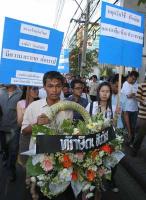
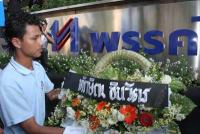
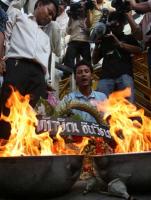
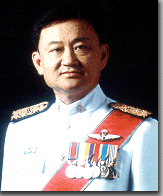
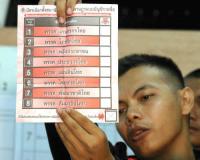
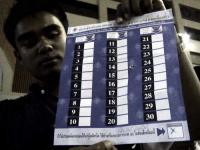
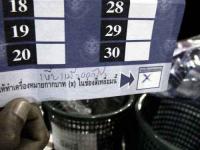
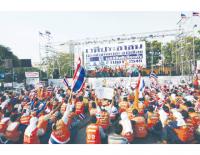
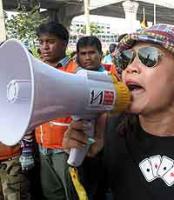
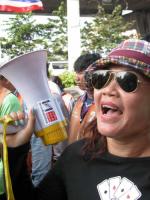
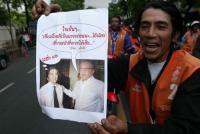
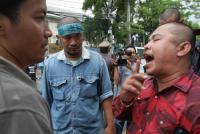
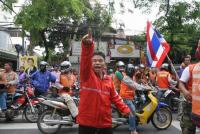
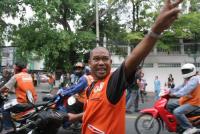
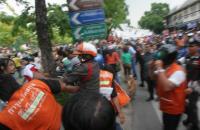
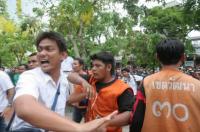
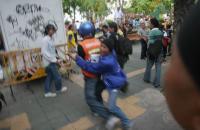
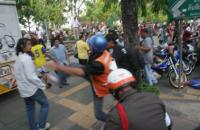
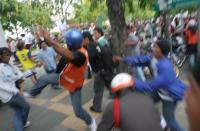
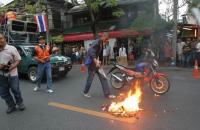
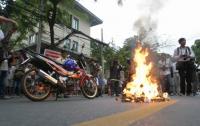
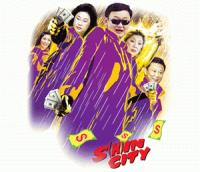





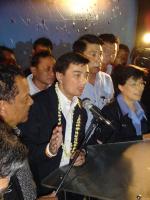
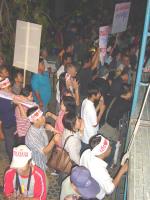
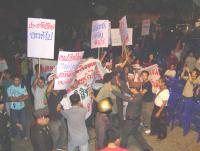
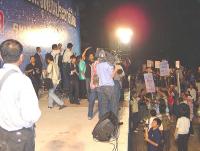
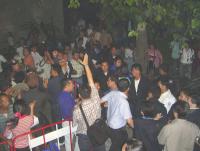
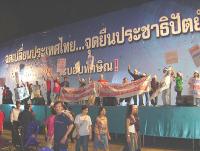
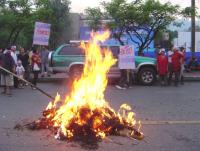
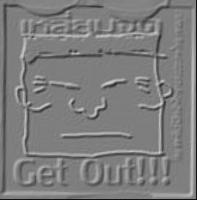

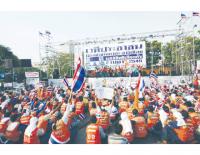
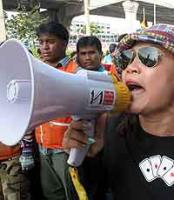
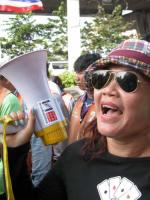
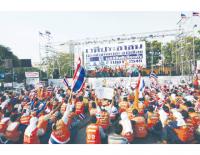
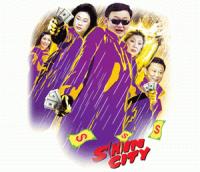
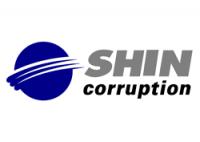
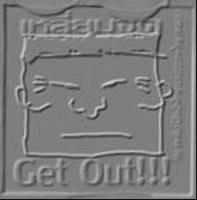
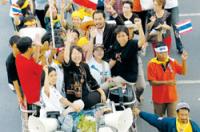


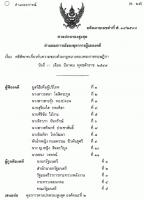
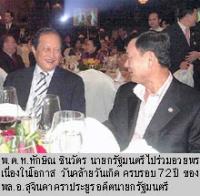








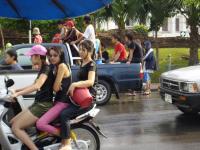

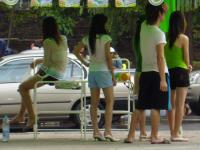

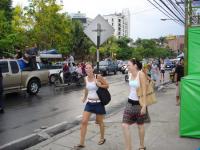
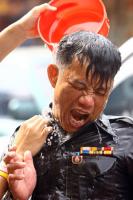
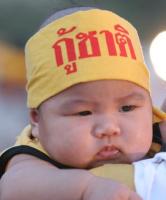


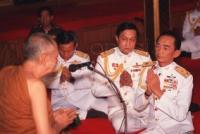
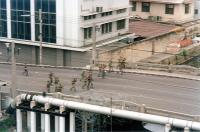
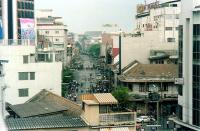
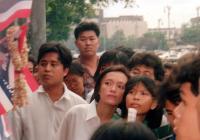


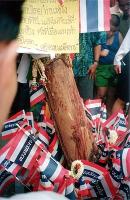
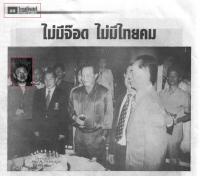
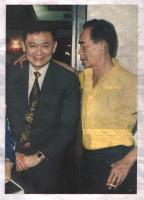
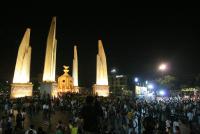
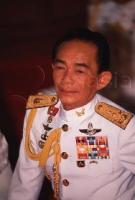
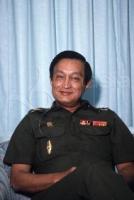
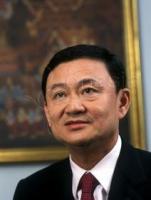
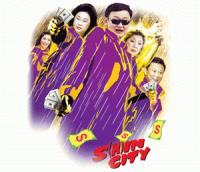

Pm Thaksin Resigns
in Thailand News
Posted
Glory!! Glory!! in Thailand
Thaksin still be a caretaker PM in this time.